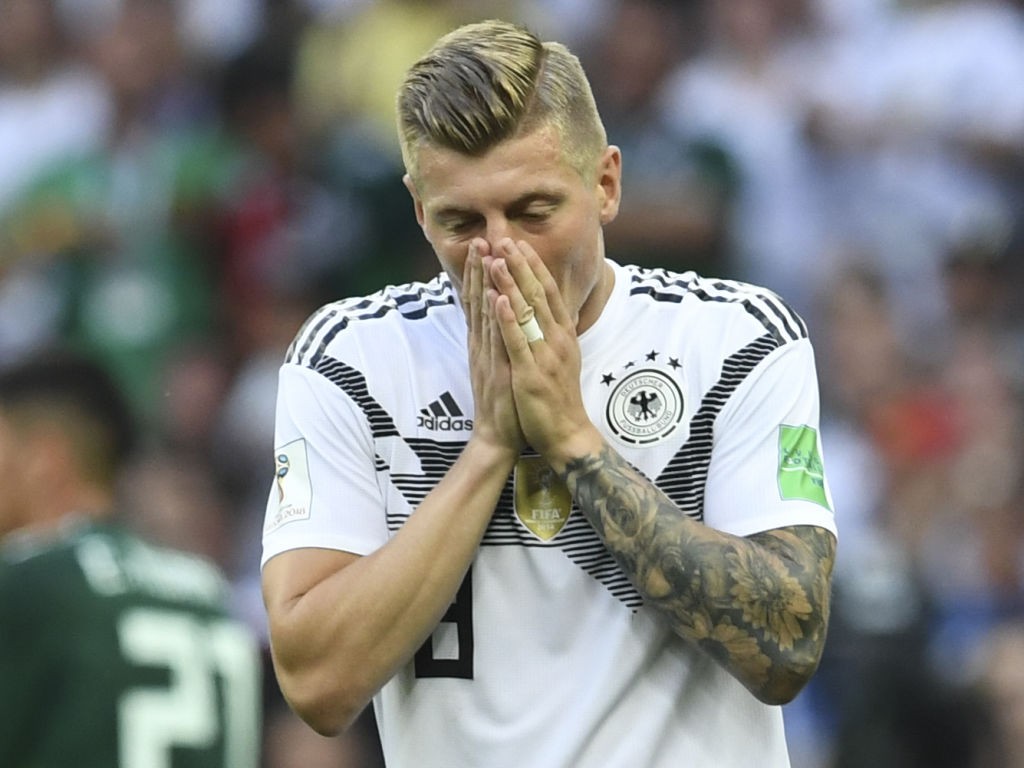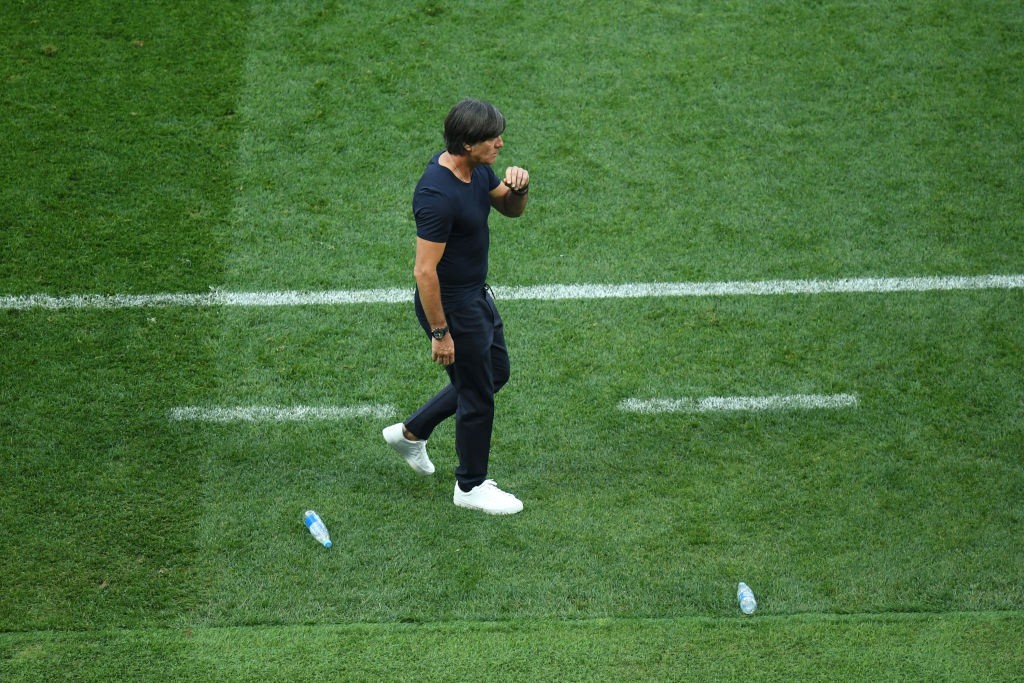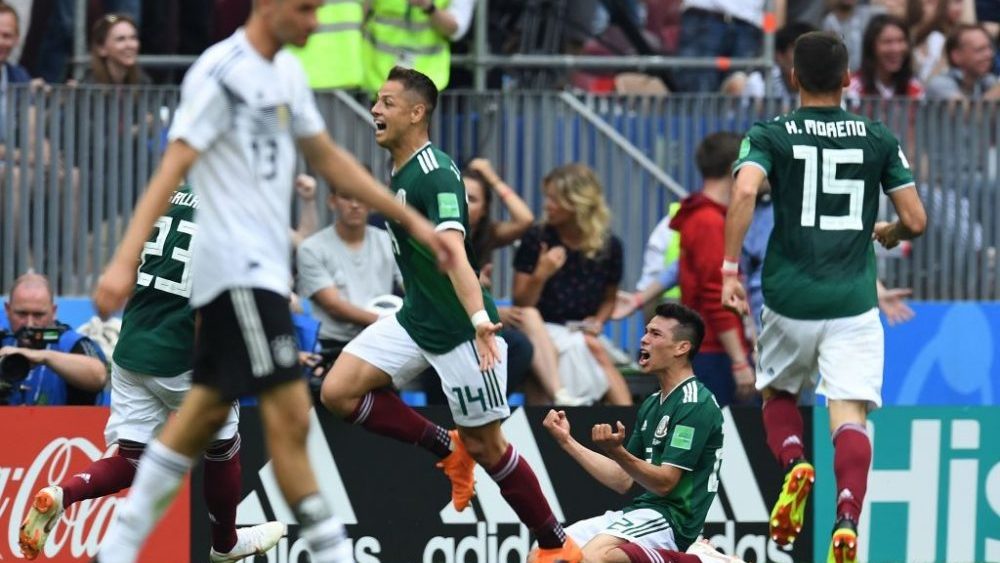World Cup-Blog: Germany – Mexico 0:1 (0:1)
Mats Hummels and Jérôme Boateng were not just disappointed, but also mightily irked. After the game they revealed in the interview that they weren’t happy with the team spirit on the pitch. They appeared isolated and alone when the Mexicans came at them time and again.
Anyhow, the Central Americans swept across Joachim Löw’s team like a tornado when they had won the ball. 66% possession, 87% pass completion, 26 shots – these statistics were in Germany’s favour.
However they won only 44% of their duels and among their 78 misplaced passes there were mistakes that must have given the national trainer even more grey hairs. In other words: the statistics lie.
It was for long spells an uninspired and weak performance from the world champions. The Mexicans, meanwhile, as a team seemed cohesive, sprightly, fresh and stronger of will. But they also had a clear plan. After the defeat Oliver Bierhoff came across surprised by the opposition’s strategy. Here the flexibility of the Mexican side at the least was not a completely new discovery.
Kroos and Hummels distributing, attacking the wings
Mexico knew that they had to take out Toni Kroos and Mats Hummels on the left side. They managed that excellently. Kroos did only make six inaccurate passes but out of the rest of his passes there were barely any dangerous ones into open areas.
Hummels made fewer mistakes in ball possession. That, however, was mostly down to the fact that he barely got the ball. The Mexicans’ pressing made sure that the Bayern player only played 37 passes and so completely vanished from Germany’s build-up play.
As such they were often forced out wide quite early, and they targeted these areas consistently. Mexico were very flexible and even changed their depth as well as their staggering in their pressing depending on the game situation. At the end of the game they dropped back increasingly, but they were then generally able to keep the opposition out of the danger zone.
It was an impressive and excellent game from Mexico. Before beginning to analyse the mistakes made by Germany’s side, that should be said. They had good compactness in every phase of play and went into duels with head and heart. After just a few seconds they generated the first big chance of the game and so underlined the brave intention to beat the world champions.
Joachim Löw has a lot of work in front of him
It is out of the question, though, that the world champions also played a large part in the surprise. The team spirit criticised by Hummels and Boateng often came to the fore in Mexican counters where both centre backs found themselves up against three or four turning, fast opponents.
The question that many fans asked themselves: how can that be? Did Löw choose the wrong strategy? Did he send out the wrong players? Or are there perhaps entirely different factors? The roughly 80 million national managers have already given in their various judgements. We too have found points in which the national team must improve if they’d like to reach the next round.
1. Team compactness
In comparison to the Mexicans, Germany’s game seemed chaotic. The defensive set-up swung between fairly good and bizarre. Sometimes all that was needed was a long ball from the opposition to outnumber Löw’s side.
Almost from nowhere Hummels and Boateng were then in big trouble. In phases of attacking pressing it was too simple to bypass the front line with Werner, Özil, Draxler, and Müller, and then to overrun the midfield with an overload. Kroos and Khedira didn’t get into any tackles and often couldn’t keep pace with their own pressing.
During phases any compactness deserted the team. That was also to be seen in the friendlies at times. When the ball was lost the distances weren’t right and Mexico were in the final third with few passes.
2. Disastrous control centre
Anyhow, Kroos and Khedira must concede the majority of the responsibility for the lacking compactness. They are the glue between attack and defence. Their passes decide the tempo of the game, and their tackles usually unburden the defence.
Here though, Kroos was highly limited in his game due to Mexico’s pressing. As a result there was indeed space for Khedira, who constantly lugged the ball forwards, but couldn’t generate any outstanding moments. His decision making was mostly bad or too slow.
He simply wasn’t able to make the most of it. The consequence saw the build-up play fall solely upon Boateng’s shoulders. The centre back was the invigorating element in the first third.

(Foto: Francisco Leong / AFP / Getty Images)
Only when Khedira was subbed off and Özil dropped deeper was there a clear improvement in game control. Khedira simply isn’t the player who is needed against well organised opponents. He’s become too slow for that. Löw will weaken his own team if he continues to select him based on past success.
Other teams will also try to mark Kroos out of the game. A creative partner like Gündogan then becomes even more important. Goretzka would be the somewhat more dynamic alternative who could exploit the space created as Khedira did in his best days. They, however, seem to be over.
3. Shutting down counters
With better occupation of the defensive midfield area, the dangerous turnovers should also be decreased. More control would mean more calm, which the German team absolutely needs. However, not all counters can be prevented by possession.
A regular problem against Mexico was that the flanks were far too open. On Kimmich’s side especially there were many dangerous counters. As such, his quality in defensive positioning was often questioned.
In fact, though, this demonstrated more than anything a deficit in shutting down counters rather than a deficit on Kimmich’s part. The 23-year-old was not protected at all. He must and should interpret his role in such an attacking way. Especially because Müller can then drift centrally and the full-back can produce his dangerous passes, runs and crosses.
However, Khedira also only seemed familiar with the attack. Nobody was there to shut the counters down in the half-spaces. Bayern fans are familiar, for example, with the Tolisso role from last season in which the Frenchman consistently covered Kimmich’s back. Khedira didn’t manage that at all. The game passed him by completely and as such he opened far too much space up for the opposition.
Even Özil, who frankly isn’t a good defender, took up shutting down counters after the substitute better than the former Stuttgart man. It’s also true, however, that Kimmich often didn’t sprint back. Like a lot of his team-mates, he too trotted far too late back into the picture from the edges when the Mexicans finished another dangerous counter. Whether that was a question of attitude or condition can’t be judged from outside. He did have a lot of ground to cover, and especially in the opening stages he often had to run up and down the entire flank. His performance was not bad, but decent at least.
Boateng and Hummels then, however, often felt forced to push up hastily due to the lack of cover, because they were the only defence left. Hummels in particular often took himself out of the game in doing so. That could have been better, but more than anything that should be a reproach to the players further forward who allowed those situations. Both were generally left out to dry rather than being personally responsible for the defeat.
4. Attitude and mentality
When Mesut Özil sprinted half the length of the pitch for Mexico’s goal to repair Khedira’s mistake, it became clear what was particularly lacking: the famed attitude. Neither Kroos nor Khedira made the impression that they were raring to go.
Both regularly trotted backwards while an attacker had to run their yards. That’s also what the centre backs were referring to when they spoke of having felt alone. When Kroos lost a duel in the first half on the halfway line, he chased after his opponent in a tempo for which one or two other midfielders would have been subbed off for five minutes later.
So before any tactical changes are made, it should be made sure of that “Die Mannschaft” support each other on the whole pitch again. The sharpness is lacking in a team that looks tired and half-hearted.
5. There are actually two wings
Marvin Plattenhardt made his World Cup debut for Germany on Sunday evening. He really played. 23 passes, 75% duels won, one shot – there are certainly worse debutants. The big boys, however, didn’t quite want to let him join in.
That was partly down to Boateng and Khedira rarely switching play. The main reason, however, was probably that Draxler wasn’t able to have any influence at all. When he got the ball, he only rarely ran with it.
The reason for him being picked was the Löw remembered a Draxler who is dynamic and can break through into the penalty area. Against Mexico the best he offered was dribbling straight into the middle to then make the wrong decision. On the left Germany played with a cautious full-back and a player who hasn’t put in a good performance for some time.
And so Germany constantly played the same plays. Always down the right, always predictable, always easy to defend. Penetration into the penalty area was rare. Germany needs, however, a second strong side in order to be able to switch sides flexibly and move the opposition about.
6. Löw seemed out of ideas
When even a manger doesn’t react to what’s going on, something isn’t right. In fact, the national manager’s performance was the most shocking thing of the evening. After just ten minutes it was clear that his side were struggling to shut counters down.
Löw could have reacted by instructing Khedira or Kimmich to offer more defensive stability. Khedira was also subbed off too late. In Julian Brandt the coach even had a weapon on the bench who caused more problems with his first involvement than Draxler had in the entire game.
He perhaps should have been brought on earlier by the coach. It makes little sense to question the manager entirely after this defeat. He’s shown too often that he can make the right decisions. But he has to face up to critical questions after this opening defeat as well. His game management was simply not there for long spells and then seemed to come too late.

(Foto: Matthias Hangst / Getty Images)
What Löw can build on
In spite of it all, it wasn’t all bad. Löw was certainly able to observe things that also did work really well. Two players had good early form and the squad offers a lot of options.
1. Silver linings Boateng and Özil
In fact there were players in the starting line-up who immediately found a good level. Boateng saved his side several times from a greater deficit, winning as many as 64% of his duels. In the build-up the defender wasn’t always convincing, but generally he was also the only creative impulse in the team in that aspect. The break has helped the 29-year-old. He seems fit and ready. Boateng can be relied on again just in time for the tournament.
Another player who was among the best Germans in a wobbly structure was Mesut Özil. The playmaker initiated almost all of his team’s attacks. It wasn’t the final or penultimate passes that he delivered to the flanks, but rather the passes into the space between the lines.
He constantly managed to get his team-mates into finishing situations. Among his four shot assists, two were also very much worth seeing. In midfield, in contrast to Khedira and the nervy Müller, he was a calming influence. After the switch Germany’s game with him in deeper zones became more dangerous and more secure.
Özil rarely made mistakes and showed in spite of all of his critics that he is needed for Germany to succeed in this tournament. But for that to happen, his team-mates in the attack must also become more sprightly, more active and more secure.
With Manuel Neuer you likewise had the feeling that he’s on the right track. He couldn’t really prove himself, but he made no errors and was actively involved in build-up play. For a conclusive evaluation a bit more evidence is indeed needed, but it’s worth mentioning that his charisma and his game already seem to be as secure as we are used to seeing.
2. The depth in the squad
The national coach is normally known for being able to react flexibly to situations. Against Sweden there could be personnel changes already, precisely because of that. Reus and Brandt were able to impress directly after coming on. Both livened up the game noticeably. Gündogan, Goretzka and Rudy, meanwhile, are candidates to replace Khedira.
Whether Löw will indeed change his starting line-up so early will be revealed in due time, but theoretically he has so many options that a few absences could certainly be compensated for. That alone should boost Germany’s courage. The 58-year-old will also have to consider his formation again. The 4-2-3-1 doesn’t quite suit the strategic set-up. With a three-man defence the spaces could be defended with more breadth on the counter.
Overview
All in all, no drama has to be made of Germany’s defeat just yet though. There is an unusual amount of room for improvement, however. Löw has all sorts of options to make a big improvement as early as the Sweden game.
That he is missing players like Lahm, Mertesacker and Schweinsteiger is undoubtable. Players who can grow into those roles are still too young or not in the right form to be able to carry the whole team. That’s a very big problem.
On the right, for example, Lahm can’t be replaced on the right side in the current system. Kimmich’s bursts forward aren’t covered for enough for that. That Lahm can be replaced as a team, however, was shown by FC Bayern this past season. Kimmich worked very well there in his attacking role. Löw could likewise insure against it with a strategic switch. In a 3-4-1-2 the team might have better balance on the pitch.
Maybe Kroos would then also have better chances of freeing himself from the pressing of the approaching opponent. The focus will also be on him in the coming weeks. If a player can deal with that, though, it’s him.
It’ll be even more important that the manager either entirely drops Draxler and Khedira or at least gets them into the necessary form. The latter may well be nigh on impossible with the shortness of time.
Now Germany have their first final against Sweden. Then it will be seen whether Die Mannschaft is able to show a reaction in just a few days. Boateng and Hummels’ reaction points out that a few things are being questioned during these few days. That’s how it should be.





